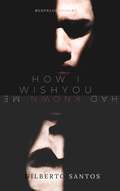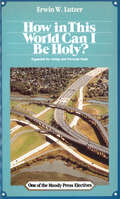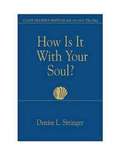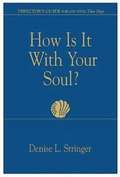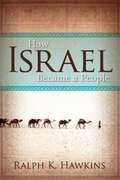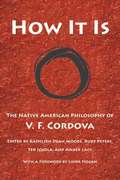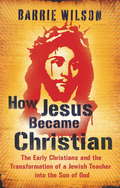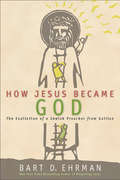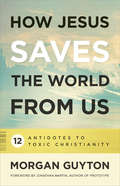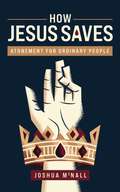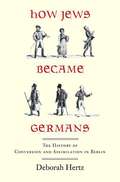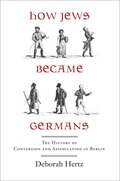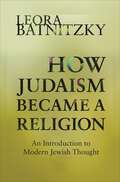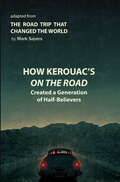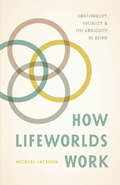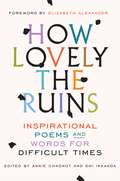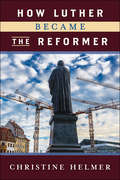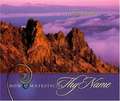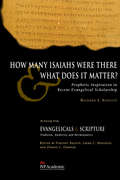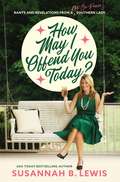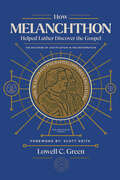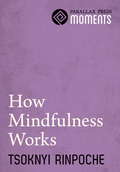- Table View
- List View
How I wish you had known me (DRAMA / Gay & Lesbian #1)
by Gilberto SantosIs it possible to fall in love with someone who's already gone? Lucas and Lauro never met, not in this life... But what would only be an uncompromising holiday trip in the interior of São Paulo turns around the life of Lauro, a psychologist always willing to help. His beliefs are to put to the test amid events that defy logic. After being involved in a mysterious suicide that would hit the small town of Vinhedo, his help to the dead's family would not end as expected; soon Lauro would be involved and in love with Lucas. On the other side, unknowingly, it would also be helping his soul mate to rise spiritually. Follow and be moved by this story, which leaves no doubt that death is just a journey and that soul mates really exist
How In This World Can I Be Holy?
by Erwin W. LutzerChristians today face a huge challenge—the challenge to resist the gravitational pull of the world; the challenge to be holy in a world of sin. This book will call you to a committed, personal Christianity. It will challenge you to rise above humdrum religion and become an instrument of God. Says Warren Wiersbe, noted author and speaker, "This is the best book on contemporary Christian living I have read in years."
How In This World Can I Be Holy?
by Erwin W. LutzerChristians today face a huge challenge—the challenge to resist the gravitational pull of the world; the challenge to be holy in a world of sin. This book will call you to a committed, personal Christianity. It will challenge you to rise above humdrum religion and become an instrument of God. Says Warren Wiersbe, noted author and speaker, "This is the best book on contemporary Christian living I have read in years."
How Is It With Your Soul Class Leader: Class Leader's Manual for Use With This Day
by Denise L. StringerHow Is It With Your Soul? is a manual that serves as the twenty-first-century Class Leader's bible. The manual contains all the information needed to be an effective Class Leader in the Wesleyan tradition. Sections in the manual are devoted to: establishing and maintaining the classical Wesleyan Class Meeting, practicing effective group dynamics, growing spiritually as a Class Leader, engaging in Christian Conferencing, understanding and cultivating the relationship shared between the Class Leader and the pastor, and appreciating the duties and appropriate boundaries to be maintained by the Class Leader. How Is It With Your Soul? is not a textbook for a course of study or instructions for teaching a time-limited program, rather it is an indispensable tool that provides practical guidance and direction for the person committed to learning and practicing ministry as a Class Leader.
How Is It With Your Soul: Director's Guide for Use With This Day (How Is It With Your Soul)
by Denise L. StringerHow Is It With Your Soul? is a complete, stand-alone session guide for use by pastors and directors of Wesleyan Class Meeting groups to train Class Leaders. The ten training sessions are designed to create group support among the Class Leaders and also strengthen the relationship between the pastor or director and the Class Leaders they oversee. Dr. Denise Stringer, author of How Is It With Your Soul?, developed the Director's Guide for use in providing a training seminar for Class Leaders while in the process of training Class Leaders in her own congregation.
How Israel Became a People
by Ralph K. HawkinsHow did Israel become a people? Is the biblical story accurate? In what sense, if any, is the biblical story true? Are the origins of these ancient people lost in myth or is there hope to discovering who they were and how they lived? These questions divide students and scholars alike. While many believe the "Conquest" is only a fable, this book will present a different view. Using biblical materials and the new archaeological data, this title tells how the ancient Israelites settled in Canaan and became the people of Israel. The stakes for understanding the history of ancient Israel are high. The Old Testament tells us that Yahweh led the Hebrews into the land of Canaan and commanded them to drive its indigenous inhabitants out and settle in their place. This account has often served as justification for the possession of the land by the modern state of Israel. Archaeology is a "weapon" in the debate, used by both Israelis and Palestinians trying to write each other out of the historical narrative. This book provides needed background for the issues and will be of interest to those concerned with the complexity of Arab-Israeli relations.
How It Is: The Native American Philosophy of V. F. Cordova
by Linda Hogan Kurt Peters Ted Jojola V F Cordova Kathleen Moore Amber LacyViola Cordova was the first Native American woman to receive a PhD in philosophy. Even as she became an expert on canonical works of traditional Western philosophy, she devoted herself to defining a Native American philosophy. Although she passed away before she could complete her life's work, some of her colleagues have organized her pioneering contributions into this provocative book.
How Jesus Became Christian: The Early Christians And The Transformation Of A Jewish Teacher Into The Son Of God
by Barrie WilsonHow the early Christians rewrote history, turning a Jewish teacher and messiah into a 'Christian' man-deity, bringing eternal life to all who believeWe often forget the undeniable fact that Jesus was Jewish. He lived and died a Jew, teaching the religion of his forbears and living by the Torah. After his death there was a 'Jesus movement' led by Jesus' brother James in Jerusalem and a 'Christ movement' led by Paul (who never met Jesus) in the Diaspora. The Christ movement deliberately sought to replace and destroy the Jesus movement.The battles of the Jewish community against the Romans, and the chaos after the destruction of the Temple in Jerusalem in AD 70, helped Paul and his party to seduce Jesus' followers away from the strictures of Judaism. Having killed off the historical Jesus, the new Christians turned the religion away from a traditional emphasis on behaviour into the most successful personality cult in recorded history.
How Jesus Became God
by Bart D. EhrmanIn a book that took eight years to research and write, leading Bible scholar Bart D. Ehrman explores how an apocalyptic prophet from the backwaters of rural Galilee crucified for crimes against the state came to be thought of as equal with the one God Almighty Creator of all things. Ehrman sketches Jesus's transformation from a human prophet to the Son of God exalted to divine status at his resurrection. Only when some of Jesus's followers had visions of him after his death--alive again--did anyone come to think that he, the prophet from Galilee, had become God. And what they meant by that was not at all what people mean today.As a historian--not a believer--Ehrman answers the questions: How did this transformation of Jesus occur? How did he move from being a Jewish prophet to being God? The dramatic shifts throughout history reveal not only why Jesus's followers began to claim he was God, but also how they came to understand this claim in so many different ways.Written for secular historians of religion and believers alike, How Jesus Became God will engage anyone interested in the historical developments that led to the affirmation at the heart of Christianity: Jesus was, and is, God.
How Jesus Saves the World from Us: 12 Antidotes To Toxic Christianity
by Morgan GuytonChristianity has always been about being saved. But today what Christians need saving from most is the toxic understanding of salvation we've received through bad theology. The loudest voices in Christianity today sound exactly like the religious authorities who crucified Jesus. <p><p> This is a book for Christians who are troubled by what we've become and who want Jesus to save us from the toxic behaviors and attitudes we've embraced. Each of the 12 chapters proposes an antidote for the toxicity that has infiltrated Christian culture, such as "Worship not Performance, "Temple not Program," and "Solidarity not Sanctimony." Each chapter includes thought-provoking discussion questions, perfect for individual or group study. <p> There are many reasons to lose hope about the state of our world and our church, but Guyton offers one piece of good news: Jesus is saving the world from us, one Christian at a time.
How Jesus Saves: Atonement for Ordinary People
by Joshua M. McNall"How does Jesus save us by dying on the cross?"One night, as Josh McNall was talking with his young daughter before bedtime, she asked him this seemingly simple question. How would you answer?The fact that "Jesus saves" is perhaps the most basic claim of Christianity. Theologians and scholars refer to the way Jesus saves us as the atonement. the follow-up question—How does he save?—demands the attention not just of theologians but of every Christ follower. How exactly does a brutal and shameful crucifixion bring salvation? Why does the Bible call it good news, and why should we?In How Jesus Saves, McNall—professor and host of the podcast Outpost Theology—answers common questions and resolves misunderstandings that many people have about the atonement. You'll explore questions like:If Jesus conquered death, why doesn't it look like it?How could an innocent person justly pay the penalty for the guilty?Why couldn't God simply forgive apart from the cross?Doesn't following Jesus' sacrificial example actually enable abuse?Through Scripture, story, and real-life applications, McNall addresses this great Christian doctrine with simplicity without sacrificing the nuance it demands.Clear and readable, How Jesus Saves will deepen your faith and commitment as a Christian, giving you the comprehension and confidence you need to explain the atonement not only to your curious loved ones but also to skeptics who might challenge your faith.This book includes reflection questions at the end of each chapter.
How Jews Became Germans: The History of Conversion and Assimilation in Berlin
by Deborah Hertz<P>When the Nazis came to power and created a racial state in the 1930s, an urgent priority was to identify Jews who had converted to Christianity over the preceding centuries. With the help of church officials, a vast system of conversion and intermarriage records was created in Berlin, the country’s premier Jewish city. Deborah Hertz’s discovery of these records, the Judenkartei, was the first step on a long research journey that has led to this compelling book. Hertz begins the book in 1645, when the records begin, and traces generations of German Jewish families for the next two centuries. <P>The book analyzes the statistics and explores letters, diaries, and other materials to understand in a far more nuanced way than ever before why Jews did or did not convert to Protestantism. Focusing on the stories of individual Jews in Berlin, particularly the charismatic salon woman Rahel Levin Varnhagen and her husband, Karl, a writer and diplomat, Hertz humanizes the stories, sets them in the context of Berlin’s evolving society, and connects them to the broad sweep of European history.
How Jews Became Germans: The History of Conversion and Assimilation in Berlin
by Deborah HertzA “very readable” history of Jewish conversions to Christianity over two centuries that “tracks the many fascinating twists and turns to this story” (Library Journal).When the Nazis came to power and created a racial state in the 1930s, they considered it an urgent priority to identify Jews who had converted to Christianity over the preceding centuries. With the help of church officials, a vast system of conversion and intermarriage records was created in Berlin, the country’s premier Jewish city. Deborah Hertz’s discovery of these records, the Judenkartei, was the first step on a long research journey that led to this compelling book. Hertz begins the book in 1645, when the records begin, and traces generations of German Jewish families for the next two centuries.The book analyzes the statistics and explores letters, diaries, and other materials to understand in a far more nuanced way than ever before why Jews did or did not convert to Protestantism. Focusing on the stories of individual Jews in Berlin, particularly the charismatic salon woman Rahel Levin Varnhagen and her husband, Karl, a writer and diplomat, Hertz brings out the human stories behind the documents, sets them in the context of Berlin’s evolving society, and connects them to the broad sweep of European history.
How Judaism Became a Religion: An Introduction to Modern Jewish Thought
by Leora BatnitzkyA new approach to understanding Jewish thought since the eighteenth centuryIs Judaism a religion, a culture, a nationality—or a mixture of all of these? In How Judaism Became a Religion, Leora Batnitzky boldly argues that this question more than any other has driven modern Jewish thought since the eighteenth century. This wide-ranging and lucid introduction tells the story of how Judaism came to be defined as a religion in the modern period—and why Jewish thinkers have fought as well as championed this idea.Ever since the Enlightenment, Jewish thinkers have debated whether and how Judaism—largely a religion of practice and public adherence to law—can fit into a modern, Protestant conception of religion as an individual and private matter of belief or faith. Batnitzky makes the novel argument that it is this clash between the modern category of religion and Judaism that is responsible for much of the creative tension in modern Jewish thought. Tracing how the idea of Jewish religion has been defended and resisted from the eighteenth century to today, the book discusses many of the major Jewish thinkers of the past three centuries, including Moses Mendelssohn, Abraham Geiger, Hermann Cohen, Martin Buber, Zvi Yehuda Kook, Theodor Herzl, and Mordecai Kaplan. At the same time, it tells the story of modern orthodoxy, the German-Jewish renaissance, Jewish religion after the Holocaust, the emergence of the Jewish individual, the birth of Jewish nationalism, and Jewish religion in America.More than an introduction, How Judaism Became a Religion presents a compelling new perspective on the history of modern Jewish thought.
How Kerouac's On the Road Created a Generation of Half-Believers: Adapted from The Road Trip that Changed the World
by Mark SayersThe content in this short e-book is excerpted from The Road Trip That Changed the World, by Mark Sayers. The book examines the influence of Jack Kerouac on Western Culture and the Church from a Christian perspective.We live in a culture of the road—restless for adventure, glorifying experience, seeing life as a journey. Dissatisfied with where we are, we are constantly on the move to redefine our sense of home. Why do we see the world like this? How did we come to believe that our best chance of finding home is to be constantly moving?Jack Kerouac was one of America&’s original proponents of the culture of the road, documenting his famous road trip across America in his classic work, On the Road. The standards he set forth in that book have influenced Western culture and church so much that we still read his book, echo his philosophies, and make movies in the vein of his iconic road trip. (A movie adaptation of On the Road is set to release winter 2012.)In this twenty-minute read, Australian cultural commentator Mark Sayers examines how Kerouac&’s influence has shaped Western traditions, our cultural identity, and the church. By analyzing our culture of the road and its influence on us, he leads us to understanding what it means to have a true sense of home.
How Kerouac's On the Road Created a Generation of Half-Believers: Adapted from The Road Trip that Changed the World
by Mark SayersThe content in this short e-book is excerpted from The Road Trip That Changed the World, by Mark Sayers. The book examines the influence of Jack Kerouac on Western Culture and the Church from a Christian perspective.We live in a culture of the road—restless for adventure, glorifying experience, seeing life as a journey. Dissatisfied with where we are, we are constantly on the move to redefine our sense of home. Why do we see the world like this? How did we come to believe that our best chance of finding home is to be constantly moving?Jack Kerouac was one of America&’s original proponents of the culture of the road, documenting his famous road trip across America in his classic work, On the Road. The standards he set forth in that book have influenced Western culture and church so much that we still read his book, echo his philosophies, and make movies in the vein of his iconic road trip. (A movie adaptation of On the Road is set to release winter 2012.)In this twenty-minute read, Australian cultural commentator Mark Sayers examines how Kerouac&’s influence has shaped Western traditions, our cultural identity, and the church. By analyzing our culture of the road and its influence on us, he leads us to understanding what it means to have a true sense of home.
How Lifeworlds Work: Emotionality, Sociality, and the Ambiguity of Being
by Michael JacksonMichael Jackson has spent much of his career elaborating his rich conception of lifeworlds, mining his ethnographic and personal experience for insights into how our subjective and social lives are mutually constituted. In How Lifeworlds Work, Jackson draws on years of ethnographic fieldwork in West Africa to highlight the dynamic quality of human relationships and reinvigorate the study of kinship and ritual. How, he asks, do we manage the perpetual process of accommodation between social norms and personal emotions, impulses, and desires? How are these two dimensions of lived reality joined, and how are the dual imperatives of individual expression and collective viability managed? Drawing on the pragmatist tradition, psychology, and phenomenology, Jackson offers an unforgettable, beautifully written account of how we make, unmake, and remake, our lifeworlds.
How Lovely the Ruins: Inspirational Poems and Words for Difficult Times
by Elizabeth Alexander Annie Chagnot Emi IkkandaThis wide-ranging collection of inspirational poetry and prose offers readers solace, perspective, and the courage to persevere.In times of personal hardship or collective anxiety, words have the power to provide comfort, meaning, and hope. The past year has seen a resurgence of poetry and inspiring quotes—posted on social media, appearing on bestseller lists, shared from friend to friend. Honoring this communal spirit, How Lovely the Ruins is a timeless collection of both classic and contemporary poetry and short prose that can be of help in difficult times—selections that offer wisdom and purpose, and that allow us to step out of our current moment to gain a new perspective on the world around us as well as the world within. The poets and writers featured in this book represent the diversity of our country as well as voices beyond our borders, including Maya Angelou, W. H. Auden, Danez Smith, Rumi, Emily Dickinson, Naomi Shihab Nye, Alice Walker, Adam Zagajewski, Langston Hughes, Wendell Berry, Anna Akhmatova, Yehuda Amichai, and Robert Frost. And the book opens with a stunning foreword by Elizabeth Alexander, whose poem “Praise Song for the Day,” delivered at the inauguration of President Barack Obama, ushered in an era of optimism. In works celebrating our capacity for compassion, our patriotism, our right to protest, and our ability to persevere, How Lovely the Ruins is a beacon that illuminates our shared humanity, allowing us connection in a fractured world.Includes poetry, prose, and quotations from: Elizabeth Alexander • Marcus Aurelius • Karen Armstrong • Matthew Arnold • Ellen Bass • Brian Bilston • Gwendolyn Brooks • Elizabeth Barrett Browning • Octavia E. Butler • Regie Cabico • Dinos Christianopoulos • Lucille Clifton • Ta-Nehisi Coates • Leonard Cohen • Wendy Cope • E. E. Cummings • Charles Dickens • Mark Doty • Thomas Edison • Albert Einstein • Ralph Ellison • Kenneth Fearing • Annie Finch • Rebecca Foust • Nikki Giovanni • Stephanie Gray • John Green • Hazel Hall • Thich Nhat Hanh • Joy Harjo • Václav Havel • Terrance Hayes • William Ernest Henley • Juan Felipe Herrera • Jane Hirshfield • John Holmes • A. E. Housman • Bohumil Hrabal • Robinson Jeffers • Georgia Douglas Johnson • James Weldon Johnson • Paul Kalanithi • Robert F. Kennedy • Omar Khayyam • Emma Lazarus • Li-Young Lee • Denise Levertov • Ada Limón • Henry Wadsworth Longfellow • Nelson Mandela • Masahide • Khaled Mattawa • Jamaal May • Claude McKay • Edna St. Vincent Millay • Pablo Neruda • Anaïs Nin • Olga Orozco • Ovid • Pier Paolo Pasolini • Edgar Allan Poe • Claudia Rankine • Adrienne Rich • Rainer Maria Rilke • Alberto Ríos • Edwin Arlington Robinson • Eleanor Roosevelt • Christina Rossetti • Muriel Rukeyser • Sadhguru • Carl Sandburg • Vikram Seth • Charles Simic • Safiya Sinclair • Effie Waller Smith • Maggie Smith • Tracy K. Smith • Leonora Speyer • Gloria Steinem • Clark Strand • Wisława Szymborska • Rabindranath Tagore • Sara Teasdale • Alfred, Lord Tennyson • Vincent van Gogh • Ocean Vuong • Florence Brooks Whitehouse • Walt Whitman • Ella Wheeler Wilcox • William Carlos Williams • Virginia Woolf • W. B. Yeats • Saadi Youssef • Javier Zamora • Howard Zinn
How Luther Became the Reformer
by Christine HelmerNo story has been more foundational to triumphalist accounts of Western modernity than that of Martin Luther, the heroic individual, standing before the tribunes of medieval authoritarianism to proclaim his religious and intellectual freedom, “Here I stand!” How Luther Became the Reformer returns to the birthplace of this origin myth, Germany in the late nineteenth century, and traces its development from the end of World War I through the rise of National Socialism. Why were German intellectuals—especially Protestant scholars of religion, culture, and theology—in this turbulent period so committed to this version of Luther’s story? Luther was touted as the mythological figure to promote the cultural unity of Germany as a modern nation; in the myth’s many retellings, from the time of the Weimar Republic forward, Luther attained world-historical status. Helmer finds in this construction of Luther the Reformer a lens through which to examine modernity’s deformations, among them anti-Judaism, anti-Semitism, and anti-Catholicism. Offering a new interpretation of Luther, and by extension of modernity itself, from an ecumenical perspective, How Luther Became the Reformer provides resources for understanding and contesting contemporary assaults on democracy. In this way, the book holds the promise for resistance and hope in dark times.
How Majestic Is Thy Name: Delighting In The Grandeur Of God
by Steve Halliday Steve TerrillCombining the most astounding photography with the most terrific information and the most marvelous scripture, this is one of the finest and most elaborate gift books published by New Leaf Press.
How Many Isaiahs Were There and What Does It Matter?: Prophetic Inspiration in Recent Evangelical Scholarship (Wheaton Theology Conference Series)
by Richard L. SchultzEvangelicals Scripture: Tradition, Authority and Hermeneutics
How Marriage Became One of the Sacraments: The Sacramental Theology of Marriage from its Medieval Origins to the Council of Trent (Cambridge Studies In Law And Christianity)
by Philip L. ReynoldsAmong the contributions of the medieval church to western culture was the idea that marriage was one of the seven sacraments, which defined the role of married folk in the church. Although it had ancient roots, this new way of regarding marriage raised many problems, to which scholastic theologians applied all their ingenuity. By the late Middle Ages, the doctrine was fully established in Christian thought and practice but not yet as dogma. In the sixteenth century, with the entire Catholic teaching on marriage and celibacy and its associated law and jurisdiction under attack by the Protestant reformers, the Council of Trent defined the doctrine as a dogma of faith for the first time but made major changes to it. Rather than focusing on a particular aspect of intellectual and institutional developments, this book examines them in depth and in detail from their ancient precedents to the Council of Trent. Provides a comprehensive, up-to-date and critical analysis. Copiously documented with primary and secondary references for further study. Non-confessional and open to readers of all persuasions, in a field dominated by confessional and often defensive Catholic studies.
How May I Offend You Today?: Rants and Revelations from a Not-So-Proper Southern Lady
by Susannah B. LewisUSA Today bestselling author Susannah B. Lewis (creator of Whoa! Susannah) is back with another hilarious take on what so many people are thinking but are afraid to say aloud.Millions of online fans have flocked to Susannah B. Lewis's hysterical, take-no-prisoners rants about her pet peeves in everyday life. Now, in How May I Offend You Today?, Lewis turns her trademark humor to ordinary events that work her nerves--from people who wear t-shirts with indecent images to public displays of affection in the plumbing aisle of Lowe's--while keeping a wry eye on herself and her own temptation to vent grievances "like a teenage girl in overalls and Birkenstocks."Weaving together anecdotes from her distinctly Southern life with frequent references to the Bible, what she calls "our manual for living," Lewis says what many of us have thought, and in the process encourages us to stand firm in our views. The witty-yet-down-to-earth banter and uplifting, inspirational message of How May I Offend You Today? gives readers everywhere the boost necessary to make it through even their most trying days.
How Melanchthon Helped Luther Discover the Gospel: The Doctrine of Justification in the Reformation
by Lowell C GreenThis book is not claiming Melanchthon rediscovered the gospel. That honor belongs to his friend and mentor, Martin Luther. Nevertheless, Dr. Lowell C. Green argues that Melanchthon helped Luther in the task. Dr. Green knew that in choosing the title, How Melanchthon Helped Luther Discover the Gospel, he risked arousing the prejudice of those who look on Melanchthon with suspicion. Green is not blind to Melanchthon's faults; at times, he is critical of him. But, he debunks the myth that when Melanchthon came to Wittenberg in 1518, Luther had already developed his Reformational doctrine. Green shows that Melanchthon brought the tools of humanism to the aid of the emerging agitation. Although maintaining a subordinate role to Luther, Melanchthon helped him repeatedly at the turning points of the Reformation.Green asserts that Melanchthon was the first to speak of the authority of the Bible over the church. In his Baccalaureate Theses of 1519, Melanchthon became the first to articulate the forensic nature of justification. Most surprisingly, Melanchthon helped Luther move from the medieval view of faith as credulitas or adhaesio (adherence) to the Reformational view of faith as fiducia (trust) and assurance of salvation. Luther testified that he learned this from Melanchthon in 1518.As late as 1519, Luther had not yet abandoned the medieval view of grace as an infused substance. Melanchthon again led the way in 1520 when he declared that grace was simply the attitude of God-His favor. In his 1521 Loci Communes Melanchthon not only pointed out that grace is not something in us, but he made the important distinction between "grace" and "the gift of grace" (the Holy Spirit). Luther generously acknowledged the brilliance of Melanchthon's Loci Communes. This and other accolades Luther showered on Melanchthon are an indication of young scholar's influence on the great reformer's central teachings.Lowell C. Green was one of America's foremost Luther scholars, and his body of work continues to inform and shape Reformation studies today. This edition of How Melanchthon Helped Luther Discover the Gospel is the fruition of more than twenty-five years of Luther studies. Dr. Green's central thrust was to challenge the "Young Luther" cult which originated in the early 1900s and gained such a stranglehold on Luther studies in the 1950s and 1960s. In this volume, Green marshals the evidence gathered over a lifetime of study, joining his voice to a choir of scholars who challenge the central thesis of the "Young Luther" movement.After thoroughly demonstrating that Luther's early works contained a medieval or Roman Catholic "analytical justification," Green traces the emergence of the Reformational doctrine and a real break with medieval theology beginning in 1519.Green amply demonstrates that the mature Luther subscribed to and frequently expressed the doctrine of justification in forensic terms so that the glory of our salvation could be ascribed wholly to Christ and for the comfort of conscience against the accusing power of the law.
How Mindfulness Works
by Tsoknyi RinpocheHow Mindfulness Works> is part of the Parallax Press Moments series of short ebooks. A stand alone chapter from Solid Ground: Buddhist Wisdom for Difficult Times.
